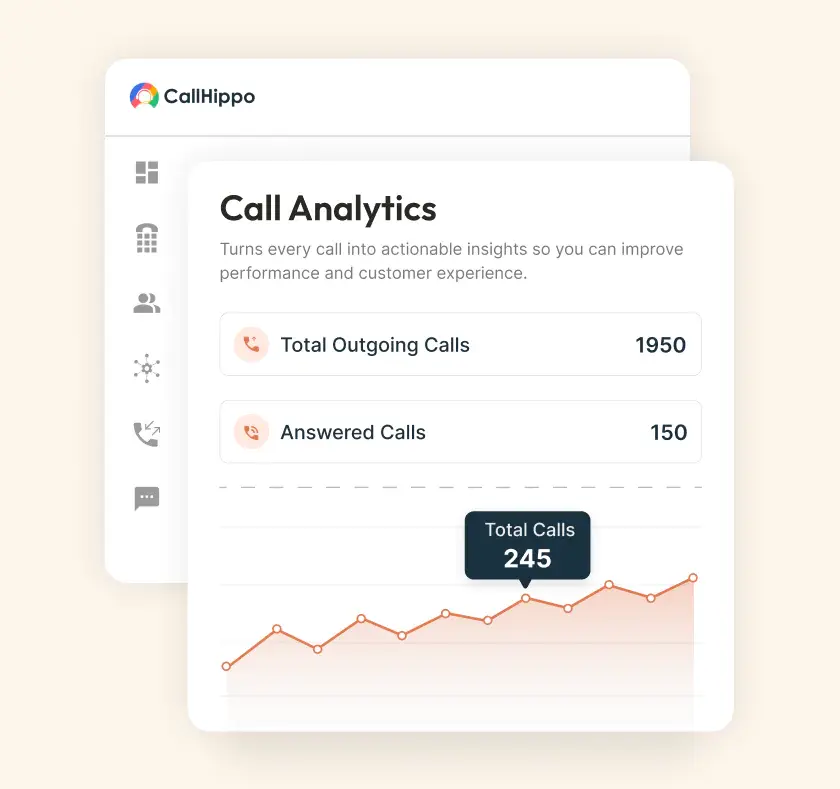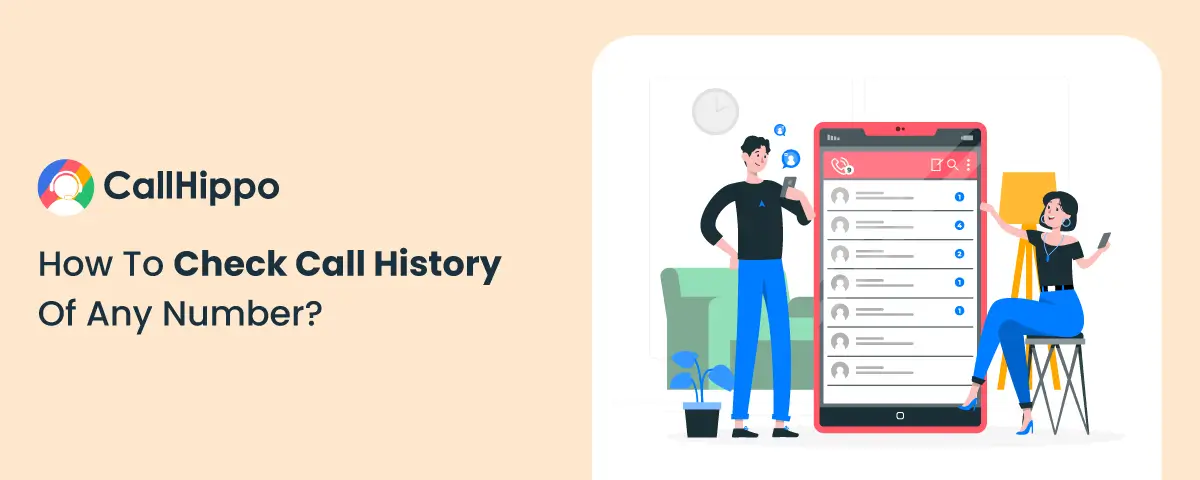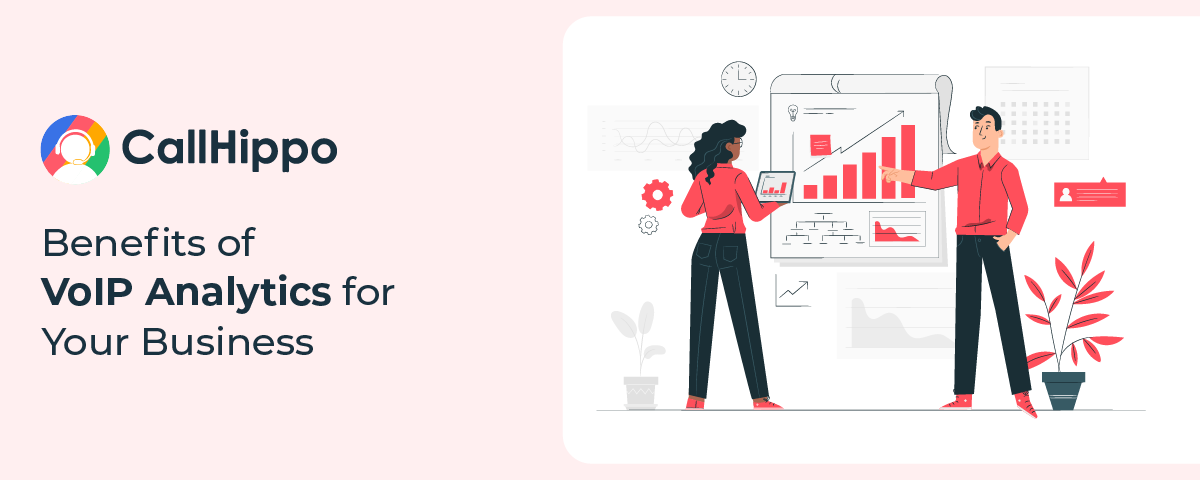Call Analytics
Missed calls, lost leads, and unclear customer feedback hurt revenue. Track every customer call to improve sales, support, and marketing performance. See what happens in each conversation without listening to hours of recordings.
- Identify which calls convert and which ones waste time.
- Catch agent mistakes before they lose you customers.
- Connect marketing spend directly to phone call revenue.

What Is Call Analytics?
Call analytics records and measures every phone conversation your business handles. It shows you call duration, wait times, conversation topics, and customer sentiment. You see which agents need training, which campaigns generate quality leads, and where customers get frustrated. The call analytics platform connects to your existing phone system and starts tracking immediately.
Search for a Virtual Phone Number for Your Business
Find the ideal virtual business phone number to streamline your communication and improve customer interaction.
Local
Toll-free
Mobile

How To Get Call Analytics Software?
Follow these three steps to start tracking calls and collecting data. CallHippo offers a free trial so you can test the system before committing to a paid plan.
CallHippo offers call analytics software that works with your existing phone system and CRM. Sign up takes two minutes, and you get instant access to the dashboard. The platform connects with Salesforce, HubSpot, Zoho, and over 100 other tools you already use. Plans start based on your call volume and team size.
Connect your business numbers to CallHippo's call analytics platform in minutes. The system automatically tracks calls from the moment you activate your account. Assign unique phone numbers to different marketing campaigns through the dashboard. Each number shows exactly which ads, landing pages, or channels drive incoming calls.
Access CallHippo's dashboard to customize which metrics you want to see. Set up automated reports that arrive in your inbox daily, weekly, or monthly. Create instant alerts for missed calls, long wait times, or low conversion rates. The dashboard shows real-time data on call duration, agent performance, and customer sentiment. Export reports to share with your team.
What Are The Benefits Of A Call Analytics Solution?
Call analytics solutions show you exactly what happens on every customer call. You get data on agent performance, customer behavior, and revenue opportunities you’re currently missing.
Track which campaigns lead to actual calls. Then, use call insights to adjust scripts, improve conversations, and increase the chances of converting leads into customers.
Monitor how agents handle calls. Then coach weaker areas, guide tone and response, and improve FCR to deliver more consistent and effective customer conversations.
Identify inefficiencies such as extra call transfers, long hold times, or idle periods. Then, adjust call routing and agent workflows to reduce unnecessary costs.
Understand why customers call, their main issues, and preferences. Next, adapt workflows and scripts to reduce repeated queries and improve overall satisfaction.
Analyze call patterns to identify unusual behavior. Monitor frequent or irregular calls, repeated attempts, or strange sources to prevent fraud and protect from misuse.
Track every call to its source. After that, allocate marketing spend to channels generating real leads and measurable sales, improving ROI on campaigns.
What Are The Key Features Of Call Analytics Software?
The right call analytics platform automatically analyses conversations, connects call data to your CRM, and sends alerts when important patterns emerge. Here are the features that actually matter.
Listen to live calls, track agent performance, and provide guidance during conversations. Use insights to improve customer satisfaction and ensure consistent call quality across the team.
Trace each call to its source, campaign, or channel. Learn which marketing efforts bring valuable leads and adjust strategies based on real call outcomes.
Track customer responses to messages. Analyze patterns, identify follow-ups needed, and ensure timely, relevant communication to improve engagement and satisfaction.
Automatically send phone call data to available agents or departments. Reduce missed calls, maintain responsiveness, and ensure customers reach the right person every time.
Generate detailed reports on call volume, duration, and outcomes. Use these insights to identify trends, improve workflows, and make informed business decisions.
Combine data from calls, SMS, and chats in one view. Understand customer journeys across channels and identify where improvements in communication are needed.
Record calls securely for review and training. Use recordings to spot recurring issues, improve agent coaching, and maintain compliance across your business communications.
Convert calls into searchable text. Quickly identify patterns, customer questions, and complaints without replaying every call, saving time and improving analysis accuracy.
Pricing
- 1 Free Phone Number
Toll-free number not included.
- Free WhatsApp Business API
- Voicemail
- Click To Dial
- AI Global Connect
Identify phone number's timezone before a call
- SMS (Text messages) & MMS
- Everything in Basic + Telephony
-
Unlimited Minutes (Includes Both Landline & Mobile Calling)
Free minutes are shared by all account users. Calling on special and premium numbers are excluded.
- 100 SMS (Text Messages)
Standard A2P charges apply.
- Basic Report Analytics
- Everything in Starter +
-
Unlimited Minutes (Includes Both Landline & Mobile Calling)
Free minutes are shared by all account users. Calling on special and premium numbers are excluded.
- 500 SMS (Text Messages)
Standard A2P charges apply.
- Call Recordings
- AI Reports / Analytics
Smart reports that summarize user & call activity.
- Everything in Professional +
-
Unlimited Minutes (Includes Both Landline & Mobile Calling)
Free minutes are shared by all account users. Calling on special and premium numbers are excluded.
- 1000 SMS (Text Messages)
Standard A2P charges apply.
- Dedicated Account Manager
- Custom Integrations
- Single Sign On (SSO)
Securely log into multiple apps with one set of credentials.
Types Of Call Analytics
Different business call analytics tool approaches solve different problems. Pick the type based on what you need to fix. Most platforms offer multiple types, so you can switch focus as priorities change.
Speech Analytics
Software listens to conversations and identifies specific words, emotions, and compliance issues. It flags calls where agents didn’t mention required disclosures or where customers used angry language.
Real-time Analytics
Access live call data while conversations happen. See call data as conversations happen. Managers get instant alerts when calls exceed a certain length or when customers mention cancellation.
Post-call Analytics
Review detailed reports after calls end. Analyze patterns across hundreds of conversations to spot training opportunities or process problems. This works best for strategic improvements rather than fixing individual calls.
Predictive Analytics
Use historical call data to forecast future outcomes. The system predicts which customers will churn based on customer data like conversation patterns, call frequency, and sentiment scores.
Historical Analytics
Examine long-term call records to find patterns in team performance and outcomes. Compare current key performance metrics against past months or years. Track if the changes you made actually improved results.
Sentiment Analytics
Measure customer emotions from speech or text after each call. Analyze customer interactions and emotions throughout each call. The software detects frustration, satisfaction, or confusion in voice tone and word choice.
How Call Analytics Works?
Call analytics data shows you what’s really happening on your business calls. It collects data, makes sense of it, and gives insights you can act on. Here’s how it works in three key steps:
Data Collecting And Processing
Call analytics starts by gathering data from every call — who called, when, and what was discussed. Advanced call analytics software can also capture keywords, call duration, and language used. For example, a multilingual chatbot can log conversations in different languages and feed them into a phone call analytics system. Then, the data is cleaned and organized for accurate reporting.
Analysis & Insights
Next, the call analytics platform looks for patterns. Which campaigns generate calls? Which leads turn into customers? Where are agents struggling? For instance, a SaaS company used call analytics to find repetitive support questions. Then, they programmed their multilingual chatbot to answer those questions, cutting handling time. Insights only matter if you act on them.
Reporting And Optimization
Finally, call analytics solutions create dashboards and reports. You can track marketing performance, lead quality, and agent efficiency. After that, you test changes and measure improvements. A UCaaS provider, for example, improved call routing after reviewing analytics, which reduced missed calls and improved customer satisfaction.
Real-World Use Cases and Applications of Call Analytics
Call analytics can improve marketing, sales, and customer support. Here are key ways businesses use it:
Marketing Attribution And ROI Optimization
Phone call analytics connects marketing campaigns to revenue outcomes. You can track which campaigns generate the most calls and influence customer acquisition. Then, budgets and resources can be directed to the campaigns that deliver measurable results.
Lead Qualification
Call analytics software helps prioritize leads. Calls are evaluated based on engagement, questions asked, and call duration. High-potential leads are flagged for faster follow-up. This ensures your team focuses on prospects that are most likely to convert, saving time and increasing efficiency.
Agent Performance Evaluation
Business call analytics monitors agent performance beyond basic metrics. It tracks resolution rates, average handling times, and customer feedback. Then, managers can identify training needs or areas where agents may require support. Continuous monitoring of call performance improves overall service quality and productivity.
Fraud Detection
Call analytics solutions identify unusual patterns that could indicate fraud or misuse. Uncommon call volumes, repeated calls from the same source, or irregular behavior are flagged. Then, teams can investigate promptly to protect revenue and maintain customer trust.
Product Feedback From Calls
Calls contain insights about products and services. Call analytics captures recurring questions, complaints, and feature requests. After that, product and service teams can prioritize improvements based on real customer input. This ensures updates are relevant and meet customer needs.
Key Considerations for Implementing Call Analytics Solutions
Buying call center analytics software is easy. Implementing it so your team actually uses it? That’s where most companies fail.
Select A Call Analytics Software Provider
Not all platforms do the same thing. Some focus on marketing attribution. Others prioritize sales coaching. A few specialize in compliance and fraud. Start with your biggest problem. If you can’t track which marketing works, prioritize attribution features. If reps perform inconsistently, look for coaching tools.
Check what the platform actually analyzes. Basic systems just transcribe calls. Advanced ones detect sentiment, measure engagement, and predict outcomes. Integration matters more than features. The fanciest call analytics platform becomes useless if it doesn’t connect to your CRM and support desk.
Scalability
Your call volume today might be 500 per week. Next year, it could hit 2,000. Check if pricing scales linearly or if there are volume breaks. Processing speed matters at scale. A platform that analyzes calls in 10 minutes works fine for 50 daily calls. At 500 daily calls, you need near real-time processing. The call analytics solution that fits today should accommodate tomorrow without requiring a platform migration in 18 months.
Integration With Existing Software
Call analytics creates value when it connects to systems you already use. CRM integration is non-negotiable. Call data should flow automatically into contact records.
Reps shouldn’t log call details manually. Your phone system integration determines what data you can even capture. VoIP systems usually integrate cleanly. Legacy PBX systems might need middleware or won’t connect at all. Check API availability. Custom integrations will happen. Your developers shouldn’t have to reverse-engineer connections.
Privacy And Compliance
Recording calls without consent is illegal in many jurisdictions. Your call analytics software needs built-in compliance features. Two-party consent states require notifying all parties that calls are recorded. The system should make disclosures automatically.
PCI compliance is critical if you process payments over the phone. Your platform must mask credit card numbers and redact sensitive information. GDPR, CCPA, and other privacy regulations give customers rights around their data. Your call analytics platform should support data deletion requests and access requests.
Advanced & Emerging Trends
Call analytics is evolving with new technologies that provide deeper insights and operational support.
Auto Summarization
Nobody has time to review 200 calls per week. Auto summarization condenses 30-minute conversations into 200-word summaries.
The system identifies key topics discussed, decisions made, next steps agreed upon, and issues raised. Managers scan summaries in seconds instead of listening to full recordings. They spot problems faster and identify coaching opportunities without drowning in audio.
Prescriptive Analytics on Calls
Descriptive analytics tells you what happened. Prescriptive analytics tells you exactly what to do. These call analytics platforms analyze successful patterns, then recommend specific actions.
“Move pricing discussion to minute 8 instead of minute 3” or “mention competitor X when customers bring up concern Y.” The system might suggest which rep should handle specific call types based on their performance history.
Cross-Channel Conversational Analytics
Customers don’t just call. They email. They chat. Each channel lives in a separate system with separate analytics. Cross-channel conversational analytics connects all conversations into one view. You see the customer who chatted yesterday, emailed last week, and called today as one continuous interaction.
This reveals journeys that single-channel analytics miss. Maybe customers who chat first, then call, convert at twice the rate of customers who just call.
Real-time Agent Assistance
Real-time agent assistance listens to calls live and surfaces information the rep needs instantly. The customer mentions a competitor, and the system displays your comparison sheet. Some systems suggest responses based on what works. The customer raises a common objection. The platform shows the three responses that overcome that objection most successfully. This turns average reps into good ones and good reps into great ones.
ROI of Call Analytics — When Does It Truly Pay Off?
Call analytics delivers both immediate and long-term benefits when used correctly.
Short-Term Gains vs. Long-Term Value
Short-term gains show up fast but stay small. You spot a script problem, fix it, and see conversion rates improve. You cut underperforming marketing channels and save budget immediately.
Long-term value accumulates differently. Your team gets better at selling because coaching improves continuously. That compounds over time. Product development informed by call analytics builds features customers actually want. You stop wasting resources on things nobody uses.
Customer retention improves when you catch and fix issues before they cause churn. Small retention improvements compound over the years and transform unit economics.
Calculating ROI Beyond Marketing Attribution
When your average rep’s close rate improves through better coaching, calculate the revenue difference across your entire team. That’s your real ROI.
Reduced training time has value. New reps listen to top performer calls and ramp faster. Shorter ramp time means revenue gets captured earlier. Compliance cost avoidance is real ROI. Regulatory violations carry hefty fines plus legal fees, plus reputation damage. Prevention counts.
Customer lifetime value increases when you deliver better experiences based on call insights. When customers stay longer, calculate the additional margin across your entire customer base.
Get Started with a Business Phone System You Can Trust
Learn how to quickly buy your virtual business phone number with CallHippo and hear from satisfied customer about how we improved their communication and customer experience.


“Thanks to the CallHippo team, we were able to resolve a tough issue with flagged phone numbers. As an EdTech startup, outbound calls are crucial for us. CallHippo’s solution not only improved our attestation score but also improved our answer rates and overall customer experience.”
Frequently Asked Questions
-
You'll finally know what's working on your calls and what isn't. See which reps actually close deals, which ads bring in real buyers, and why customers hang up. Most teams find problems they had no idea existed.
-
Call tracking counts calls. Call analytics tells you what was said, how people felt, and why deals closed or died.
-
Yes, it catches when your reps forget disclosures or access data they shouldn't. You fix issues before auditors find them.
-
The quality depends on the platform. Cheap ones struggle with accurate results. Good ones get it right most of the time. None is perfect, but they get better as they process more calls.
-
Yes, in CallHippo, you can customize the analytics dashboard.
-
Quick wins show up in weeks; you'll spot obvious problems fast. Real performance improvements take months. Your team needs time to adjust based on insights. Most companies see meaningful ROI within six to twelve months.




